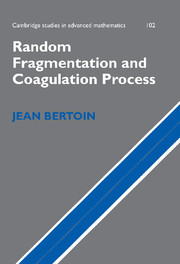2 - Random partitions
Published online by Cambridge University Press: 07 December 2009
Summary
Fragmentation chains which have been discussed in the preceding chapter, only form a special and rather simple sub-class of fragmentation processes which enjoy the self-similar and branching properties. The construction and the study of the general family are harder, since we can no longer rely on a discrete genealogy. We shall now prepare material to circumvent this fundamental difficulty, at least in the conservative or dissipative case. In this direction, we shall first introduce several notions of partitions (for masses, for intervals, and for the set of natural integers) and develop their connections. Mass-partitions induced by Poisson random measures, and in particular the so-called Poisson-Dirichlet partitions, will receive special attention. Finally, Kingman's theory for exchangeable random partitions of ℕ will be presented in the ultimate section.
Mass-partitions
In this section, we introduce some elementary material on the simple notion of partition of a unit mass.
Partitions of a unit mass
A partition of some set E is a collection of disjoint subsets whose union is E. When one focusses on finite sets and their cardinals, this yields the notion of partition of integers in combinatorics: A partition of n ∈ ℕ := {1, 2, …} refers to a finite family of positive integers, say {p1, …, pk}, with p1 + … + pk = n. We stress that this family is unordered; for instance {2, 3} and {3, 2} represent the same partition of 5.
Information
- Type
- Chapter
- Information
- Random Fragmentation and Coagulation Processes , pp. 66 - 111Publisher: Cambridge University PressPrint publication year: 2006
